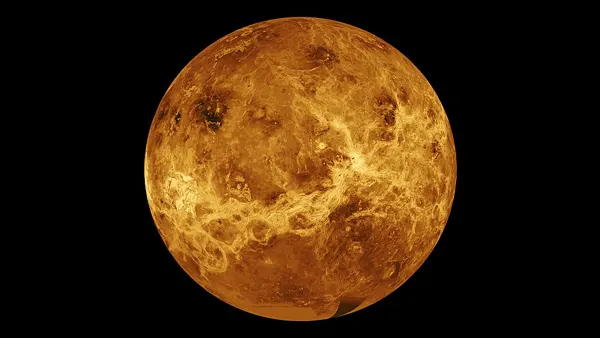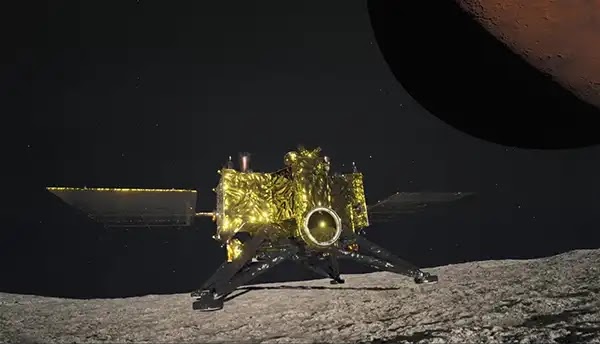Life in the clouds of Venus?
A new study suggests that some forms of life could exist in Venus’ sulphuric acid clouds.
Venus. Image credit: NASA/JPL, public domain, via Wikimedia Commons
CONTINUA DEPOIS DA PUBLICIDADEA team of chemists and planetary scientists from Worcester Polytechnic Institute, Nanoplanet Consulting and MIT has sparked intriguing speculation by discovering evidence that a form of life, using sulfuric acid as a liquid medium, could exist in the clouds surrounding the planet Venus.
Venus, often referred to as Earth’s “infernal twin” due to its inhospitable conditions, has been the subject of intense research in search of signs of life. Previous research had already suggested that if there were any life forms on Venus, they would probably be in the clouds, where temperatures are more moderate compared to the scorching surface.
However, an additional complexity arises when considering that Venusian clouds are mainly composed of sulphuric acid, in contrast to terrestrial clouds, which consist of water.
Sulfuric acid, a mineral acid composed of sulfur, oxygen and hydrogen, is known for its odorless, colorless and corrosive nature on Earth. However, the researchers emphasize the lack of evidence proving that all forms of life need a specific liquid medium to subsist.
In this context, the new study explores the possibility of sulphuric acid serving as a favorable environment for alternative forms of life.
CONTINUA DEPOIS DA PUBLICIDADEThe scientists conducted a series of experiments to analyze the stability of amino acids, essential building blocks for the formation of proteins and therefore for life as we know it.
Twenty biogenic amino acids were suspended in vials of sulfuric acid for four weeks, simulating the temperatures found in the cloud layers of Venus, located between 48 and 64 kilometers above the surface. Surprisingly, 19 of these amino acids remained unreactive or were chemically modified in such a way as to allow viability for life.
The researchers’ speculation extends to the possibility of amino acids reaching the Venusian clouds, possibly carried by meteors.
CONTINUA DEPOIS DA PUBLICIDADEThese amino acids, when interacting with other organic materials delivered by the meteors, could trigger the beginning of a form of living material adapted to an environment with sulphuric acid. Amino acids, which are fundamental in the formation of proteins, are an essential requirement for life on Earth.
In addition, the researchers’ conclusions suggest a significant expansion of the possible conditions for sustaining life on other planets in the universe. The discovery of a potential alternative liquid medium on Venus opens the door to reflection on the diversity of environments conducive to life in different parts of the cosmos.
This pioneering research challenges preconceptions about the basic requirements for the existence of life and offers an intriguing new perspective on cosmic possibilities. The search for extraterrestrial life continues to surprise and challenge our understanding of the universe, highlighting the continued need for scientific exploration and investigation.
CONTINUA DEPOIS DA PUBLICIDADE
// Paste here your scripts that use cookies requiring consent. See examples below
// Google Analytics, you need to change 'UA-00000000-1' to your ID (function(i,s,o,g,r,a,m){i['GoogleAnalyticsObject']=r;i[r]=i[r]||function(){ (i[r].q=i[r].q||[]).push(arguments)},i[r].l=1*new Date();a=s.createElement(o), m=s.getElementsByTagName(o)[0];a.async=1;a.src=g;m.parentNode.insertBefore(a,m) })(window,document,'script','//www.google-analytics.com/analytics.js','ga'); ga('create', 'UA-00000000-1', 'auto'); ga('send', 'pageview');
// Facebook Pixel Code, you need to change '000000000000000' to your PixelID !function(f,b,e,v,n,t,s) {if(f.fbq)return;n=f.fbq=function(){n.callMethod? n.callMethod.apply(n,arguments):n.queue.push(arguments)}; if(!f._fbq)f._fbq=n;n.push=n;n.loaded=!0;n.version='2.0'; n.queue=[];t=b.createElement(e);t.async=!0; t.src=v;s=b.getElementsByTagName(e)[0]; s.parentNode.insertBefore(t,s)}(window, document,'script', 'https://connect.facebook.net/en_US/fbevents.js'); fbq('init', '000000000000000'); fbq('track', 'PageView');
CONTINUA DEPOIS DA PUBLICIDADE}
Quer continuar acompanhando conteúdos como este? Junte-se a nós no Facebook e participe da nossa comunidade!
Seguir no Facebook

